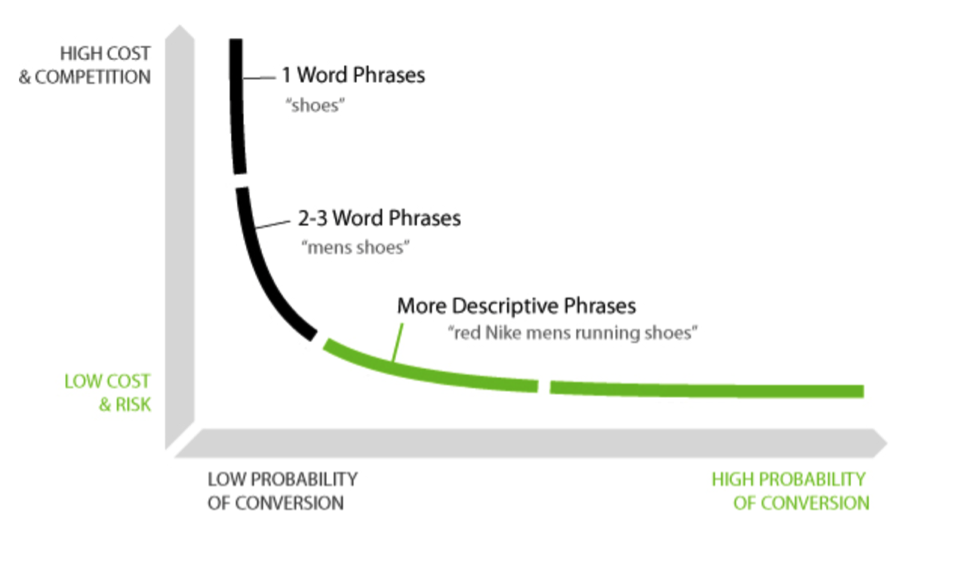Blog
How to optimize long-tail keyword search to boost conversions
In the ever-evolving ecommerce landscape, capitalizing on the power of long-tail keywords within on-site search can significantly impact your store’s growth and conversions.
Ask yourself the question, if someone is looking for something very specific on your website, are they able to find it? If you’re the owner of a women’s fashion store, are customers able to search for specific terms like strapless and long evening dresses?
It’s important to understand how your site search handles these very specific terms. We can look at these customers as the equivalent of those who visit a brick-and-mortar store and ask store employees questions. In this case, if you show them your regular dresses, they’re much more likely to visit another store and continue their search elsewhere.
The Importance of Long-Tail Keywords in On-Site Search

It’s vital to have an understanding of long-tail keywords and Econsultancy published an insightful graph on this (above). The image shows an example of what people might search for in an online shoe store. The vast majority of people are likely to search for the term ‘shoes’. But, the conversion rate on that will not be great due to the sheer volume and variety of results yielded. However, when we get to two or three-word phrases (i.e. – men’s shoes), now we start seeing the quantity of those declining, but the conversion rate increasing. Better yet, when customers are able to use 4 or 5 words (i.e. – red Nike men’s running shoes), we can be even more certain that these customers are looking for specifics. As a result, if you have those products, it’s important that your search is able to understand all these terms and to show them at the right time.
So, long-tail keywords are search phrases that consist of three or more words and are highly specific to a user’s search intent. When it comes to on-site search for eCommerce stores, long-tail keywords offer several advantages:
- Higher conversion rates: Long-tail keywords usually indicate a strong intent to purchase, as users are more likely to search for a particular product or service. By providing accurate search results for these queries, your store can significantly improve conversion rates.
- Enhanced user experience: Long-tail keywords allow eCommerce stores to deliver a more personalized shopping experience, as they cater to the specific needs of the user. This can result in increased customer satisfaction and repeat purchases.
- Better product visibility: By optimizing on-site search for long-tail keywords, eCommerce stores can ensure that relevant products are easily discoverable, increasing the likelihood of conversions.
Optimizing On-Site Long-Tail Keywords
Ultimately, it’s key to understand how effective optimizing long-tail keywords within your site search can be. Although these terms will have lower search volumes, the people that use them will be higher-intent shoppers. In turn, these terms will most likely have the highest conversion rates. So understanding long-tail keywords and how they could enhance your site search is important when looking to boost website conversion rate.
To maximize the benefits of long-tail keywords in on-site search, eCommerce stores in various industries should adopt the following strategies:
- Research and analysis: Use your ecommerce platform’s analytics tools to identify high-performing long-tail keywords and uncover insights into user search behavior.
- Search result optimization: Improve the relevance and accuracy of on-site search results for long-tail keywords by refining product titles, descriptions, and tags.
- Content creation: Develop high-quality, informative, and engaging content that addresses the search intent of long-tail keywords, such as product guides, blog posts, and tutorials.
AI-Powered Strategies for On-Site Long-Tail Keyword Optimization
Artificial intelligence (AI) has emerged as a powerful tool in enhancing on-site search capabilities for long-tail keywords. These AI-powered strategies include:
- Predictive keyword analysis: AI algorithms can analyze on-site search query data to identify new long-tail keyword opportunities and predict their potential impact on conversions.
- Natural language processing (NLP): AI-powered NLP technology helps eCommerce stores deliver accurate and relevant search results, even for complex or misspelled long-tail keywords.
- Personalized user experience: AI can help customize the user experience based on search intent, delivering relevant product recommendations and promotions to encourage conversions.
Klevu AI is a leading AI-driven search engine for ecommerce, that stands out as the ideal solution for optimizing on-site long-tail keywords. Klevu AI offers several key features that make it a powerful tool for driving conversions:
- Advanced search capabilities: Klevu AI’s natural language processing (NLP) technology ensures a seamless user experience by delivering accurate and relevant search results for long-tail keywords.
- Self-learning algorithms: Klevu AI continuously learns from user behavior and search data, providing more accurate and relevant long-tail keyword suggestions over time.
- Customizable search results: Klevu AI allows merchants to curate and prioritize search results, promoting high-converting products and enhancing the overall shopping experience.


